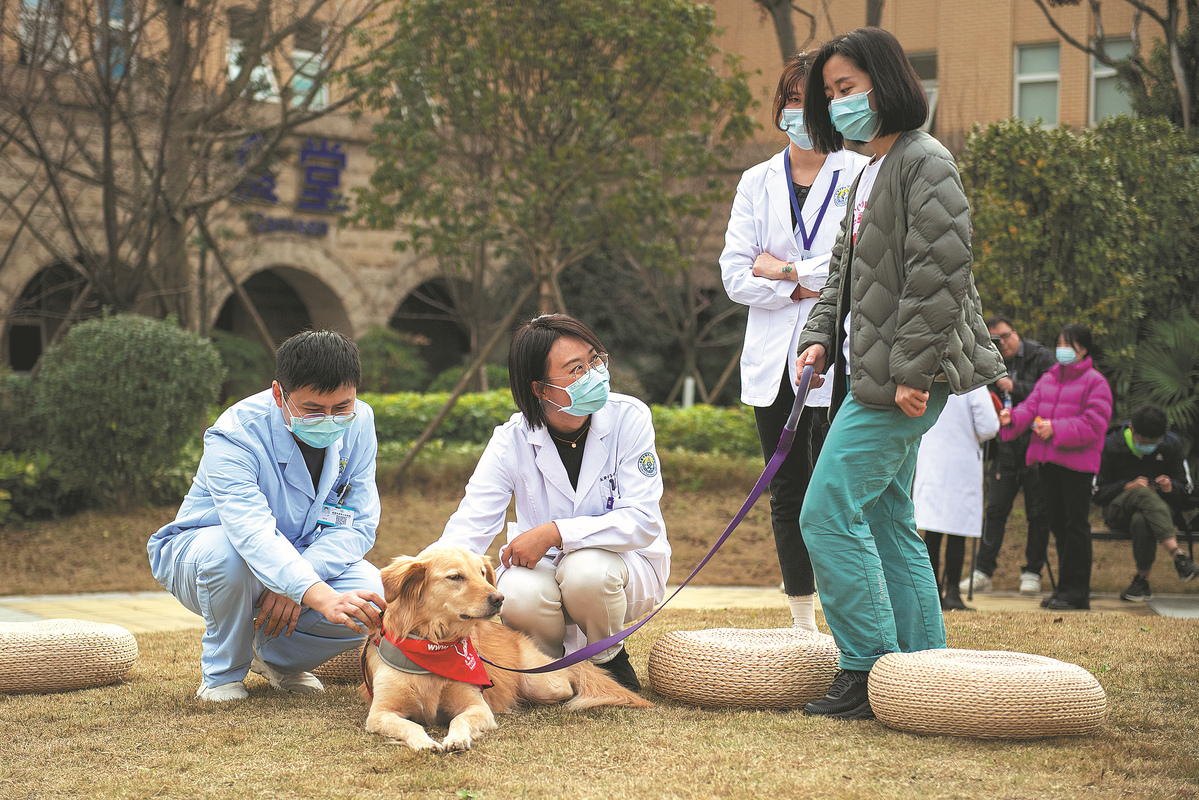Therapy dogs help hospital patients


Wu said Jin Yi and Jin Er, twin boys in Nanjing, Jiangsu province, have been regularly interacting with therapy dogs for nine years. The twins initially lacked social skills, but now teenagers, they are friendly to strangers and are helping out with family chores.
At Shanghai Jiahui International Hospital, a patient surnamed Qiu, 27, happily touched each dog and took photos with them. She halted her further education in Germany after she was diagnosed with cancer, and returned to Shanghai for medical treatment. Qiu has been hospitalized for more than two months.
"Life in a hospital environment is dull and tedious, and I feel psychologically challenged, especially when I experience bodily discomfort," Qiu said.
"The dogs are very friendly and obedient, and are somehow able to understand what we are saying. I can also sense a strong emotional connection between the dogs and their owners. I feel warmed by all of this and I'm very happy today."
Qiu added that she is interested in taking part in outdoor activities with the therapy dogs after her physical condition improves.
Lena Salzinger, 9, from Texas, United States, was at the hospital, as her mother was having breast cancer surgery that day. The girl relocated to Shanghai with her parents in October.
She said: "After coming to the city and settling in, we adopted a 1-year-old corgi. I wanted to come to see these dogs today because my corgi is so good when somebody needs extra attention. She's a very intuitive dog. She knows when I'm sad, and she'll come to me."
She added that therapy dogs are commonplace in the US.
"I hope the project at the hospital is successful and is embraced in Shanghai and many other places, because dogs are so special and really do help people at any time," she said.
Di Xinyu, head of social work and volunteer projects at Jiahui hospital, said: "Some patients' eyes lit up when they saw the dogs. We believe they will help the patients develop a more optimistic attitude and cooperate better in medical treatment."
The dogs were introduced at the hospital early this year. Di said certified therapy dogs receive special training, complete a course of vaccination, and can comfort patients who may suddenly feel socially isolated after becoming ill.
Di used to work at a hospital in the US, where she often saw therapy dogs visiting patients and helping them with rehabilitation training.
At Jiahui hospital, the dogs stay with tumor patients, those requiring physical rehabilitation, and patients with mental illness, especially the young.
"Some minors may have misunderstandings with their parents, so we design games for families to play with the dogs as a way to increase communication between children and their parents. The dogs act as a bridge in such communication," Di said.
Public hospitals, including Shanghai Mental Health Center and Shanghai Ruijin Hospital, are also considering introducing therapy dogs.
At a training session scheduled for later this month involving more than 200 hospitals and other medical care institutions nationwide, animal therapy will be introduced as one of the nonmedical therapies. The session is being organized by Peking Union Medical College Hospital and Orpea Group, a major nursing home operator in France.
Wu, from Paw for Heal, said that in addition to individuals with cognitive impairment, therapy dogs have helped those with excessive work stress, along with students and teachers under pressure from exams.
In January, data from the University of California, Los Angeles showed that 60 percent of US higher education institutions have used the services of therapy dogs.
Animal therapy is used widely in the West. Eight years ago, the US already had more than 50,000 such dogs to help people with conditions such as post-traumatic stress disorder and those facing significant social upheaval.
























